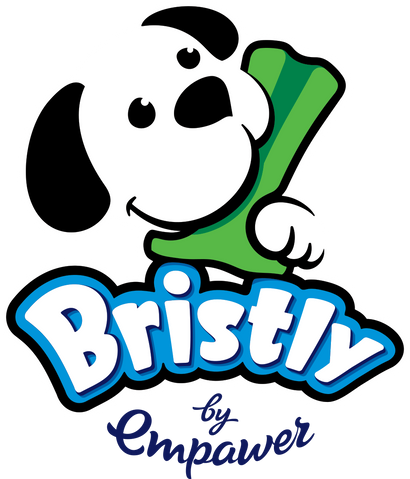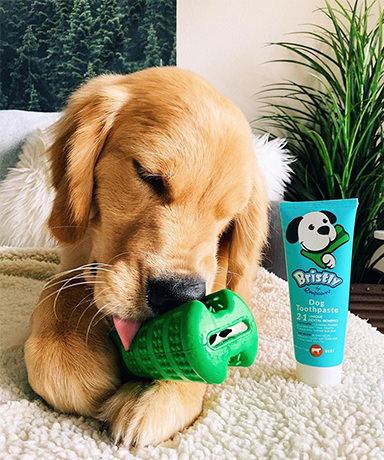Your Cart is Empty

Time to make your inbox pawsome
Sign up today and get 10% OFF your first purchase!


Dog dental health is finally becoming recognized as being important by pet parents around the world. If you grew up with dogs, odds are you heard your parents or grandparents claim that dogs' mouths are cleaner than ours. We've debunked this myth before, but let's consider it again. How is it possible for a dog's mouth to be cleaner than your own when they don't brush their teeth?
There are no special bacteria or cells in dog saliva responsible for cleaning their mouths, and their mouths are in no way self-cleaning. That being said, it's important to take care of your dog's dental health. Poor dental care can lead to periodontal disease, a common problem in dogs ages three and up, that can cause them serious harm in the future.
Check out these doggy dental health mistakes and learn how if you're making them, you can fix them.
This mistake is the most obvious. Just like you, your dog should be brushing their teeth every day. But due to a lack of thumbs, it's not possible for them to hold their own toothbrush and have at it. In the past, pet parents have had to buy a dog toothbrush and toothpaste and wrestle with their dog to brush their teeth. Not only was this method uncomfortable and time-consuming, but it was also often unsuccessful. Most dogs hate having their teeth brushed.
However, what most dogs don't hate is chewing. It's simply part of their animal instinct, so don't get too mad at them when you find holes in your socks! Thanks to the Bristly Brushing Stick, dogs can now brush their own teeth because they'll just think they're chewing on a bone. While bones can scrape away plaque and tartar, and massage the gums, they are designed for dogs to have fun with, not specifically for dental hygiene. For this reason, they can't reach every tooth or every nook and cranny of your mouth like the Bristly can with its bristles and nudges.
Now that brushing your dog's teeth is easier and simpler than ever before, there's no reason not to.
Many pet parents feed their dogs dry food versus canned because they believe kibble will help clean their dog's teeth. However, the results of scientific studies about whether dry kibble is better for dog dental health are inconclusive. Past studies show that dogs who ate dry food had better oral health than those who ate canned, but a 1996 study found few differences in regards to their levels of tartar, gingivitis, and periodontal bone loss.
Another study from 2007 looked at the effects of the size of the kibble and found that increasing the kibble size 50%, resulting in a significant decrease in the accumulation of tartar. More recent studies have also suggested that feeding dogs dry food and daily dental chews results in better oral hygiene than dry food alone.
You will also find many special dental diets on the market today as well. Diet can factor into the overall health of your dog in a variety of ways. Make sure that you feed them nutritionally balanced dog food. Some foods inhibit bacteria growth and the formation of plaque.
Try to feed your dog fewer table scraps as human foods high in carbs and sugars can have a negative impact on dog oral health. Also, consider all of the non-food items your dog puts in his or her mouth. Be more mindful of what your dog is eating outside and inside your home.
Remember, before making a major change to your dog's diet, it's important to discuss it with your vet.
Believe it or not, the water you give your dog will affect their dental health. While you probably aren't giving them swamp water, you should understand your own tap water before giving it to your pup. If you are connected to city water, you can typically expect that the water you and your dog drink is safe. However, many homes are connected to well water that can carry bacteria into your dog's mouth. Their mouths are already littered with all kinds of bacteria, just like your own, you make sure that your water isn't doing more harm than good.
You can request reports to understand what's in your water from the local water company, or you can switch your dog to filtered water or water bottles. Because water bottles can get expensive, and plastic takes a toll on our environment, we recommend getting a water filter that goes right onto your sink or trying out a filtered water pitcher instead.
Also, remember that your dog's water bowl should be cleaned regularly. When they drink, they dip their tongue in the water and put the bacteria from their mouth right into their water bowl, which goes back into their mouth even after it has been brushed clean.
Consider how often you clean your own glasses. While it may not be necessary to grab them a new bowl after every use, keep a few clean and on hand so that you can switch them out every couple of days.
Most pet parents don't think about their dog's toys after they buy them and give them to their fur baby. However, toys are worth taking a second look at once you consider all of the bacteria that can get trapped inside and on them. Plush toys are meant to be like stuffed animals for pets. Think about all of the fibers that go into your dog's mouth and in between their teeth. Each time your dog chews on their favorite toy, they are taking bacteria from their mouth and putting it directly onto their toy. Plush toys also stay moist following an intense chew session, which makes them a breeding ground for bacteria. When your dog goes to chew on them again, they put the bacteria and more back into their mouths.
Even bones that don't have any fibers still collect bacteria every time they go into your dog's mouth.
